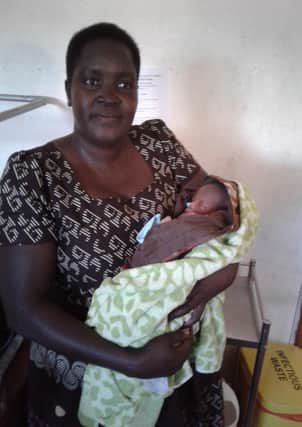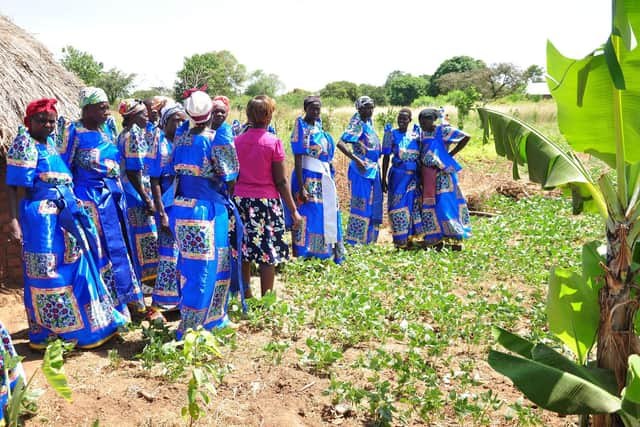Esther is empowering Ugandan women to create a brighter future


Self Help Africa’s Esther Ainyo said the coronavirus pandemic has had a devastating impact on Teso, a sub-region of eastern Uganda where she lives and works
“When Covid-19 struck the community in Teso was not spared, the period of lockdown was hell, the businesses collapsed because weekly markets were closed for 11 months, small and medium businesses experienced the largest effects of the risk associated with Covid-19 compared to large scale businesses.”
Advertisement
Hide AdAdvertisement
Hide AdEsther is programme manager of the for Self Help Africa and also recently assumed a representative leadership role, where she is responsible for representing the charity with 52 farming groups and 1,5000 farmers supported by Self Help Africa in the Teso region.


She added: “Agriculture enterprises were worst hit (by the pandemic) due to challenges of accessing inputs arising from transport restrictions and the ban on weekly markets, as well as due to the lost demand and the shift from consumption of fresh agricultural produce to dry rations.
“The burden of providing for the family was also left to the women who are ever home as the men spend most of their time in the centre and return home late with empty hands.”
Esther said rural communities living in poverty, who rely on the government’s free healthcare programmes, experienced a reduced access to primary healthcare. “As a result there was an increase in number of preventable deaths during childbirth and in other health emergencies, and an increased occurrence of deaths due to preventable disease like malaria. Access to family planning and other healthcare programmes has also been compromised.”
The education sector has not been spared either.
Advertisement
Hide AdAdvertisement
Hide Ad“Education is considered to be a powerful tool for growth throughout many sectors in Uganda. The country has even labelled education as a key component for driving social growth, economic development, and transformation since becoming politically independent, as well as helping to achieve a more united nation and democratic reforms.
“With children staying at home for about one year this dream is being threatened. The government encouraged distanced learning but resource disparities between rural and urban areas are exacerbated by the pandemic, as rural areas are less likely to have access to the technology needed to successfully implement distance learning. Technologies including radio, television, or the internet.
“The prolonged stay of children at home affected the girls more than the boys with increased rate of teenage pregnancy being reported. In order to gain basic necessities like sanitary towels, girls have engaged in transactional sex with men who take advantage of their need for money.”
Esther added domestic violence is a “very disastrous habit in families.”
Advertisement
Hide AdAdvertisement
Hide Ad“It became a very challenging turmoil during the Covid-19 lockdown period. The pandemic deepened gender inequalities because “the burden of caring for children at home and sick or elderly family members falls disproportionately on women”. The forced isolation of families in their homes created a dangerous situation and triggered domestic conflicts and episodes of abuse within the family, ie by the end of June 2020, Uganda had registered over 21,260 cases of child neglect, sexual and physical abuse (Ejang, 2020).
“Due to the isolation regulations being enforced, women are forced to stay in homes with abusive partners and are at risk of being severely harmed or even murdered though even men have been brutalised by women during the COVID-19 recess.”
Esther pointed out that according to the Ministry of Health, Uganda will need a total of 45m doses of vaccines if all the vaccines provided are of two doses. Esther’s job is a busy one, and she is enjoying her new leadership role with Self Help Africa.
“Not only does it give me the opportunity to lead but also to nurture and mentor my team. I lead a team of five – three female and two male. I believe in working as a team because we all depend on each other to make things work.
Advertisement
Hide AdAdvertisement
Hide Ad“Within Self Help Africa women are encouraged to take leadership roles and are given the necessary support to ensure that they find their leadership role enjoyable.
“Of course there are always times when people walk into the workplace expecting to meet a male boss and they find the opposite, you can tell it from their faces, but trust me by the time the leave the office they already believe in me!”
In addition to her important role with the charity, Esther is mum to five children, Pauline, 19, Faith,15, Fortunate, 13, Jesse, 4, and Elijah, who is 1 year and 7 months.
“All the girls are in boarding school in Kampala, the capital city of Uganda which is approx. 350km from home. The term is three months long and as parents we are allowed to visit them once a term however we are not allowed to visit them at school and are encouraged to give them enough necessities to last them the entire term,” said Esther.
Advertisement
Hide AdAdvertisement
Hide Ad“I don’t take office work home because when home I want to dedicate my time to my family. My weekends are for my family, I don’t work on weekends. I take my family out once a month for a picnic or lunch at a recreation centre.”
Women in Uganda play a pivotal role in agriculture.
“The national population engaged in agriculture is 66.9 per cent and 75.5 per cent of this are women. The crops majorly grown are cassava, sweet potatoes, sorghum, finger millet, peas, groundnuts and rice. Livestock such as cattle, goats, and sheep, chicken are also kept by the farmers mainly for food and income, and oxen used for opening up land.
“Men are normally responsible for initial opening and clearing of land to be cultivated and participate in its cultivation along with the women who are also primarily responsible for household food security.
“The women basically grow food crops for feeding the families while the men grow cash crops for sale. In terms of livestock the women own small ruminants like goats and chicken while their male counterparts own the cattle. The women do most of the agricultural activities like planting, weeding, harvesting and storing the crops.”
Advertisement
Hide AdAdvertisement
Hide AdDuring her meetings with the farmers, Esther encourages them to diversify their sources of income.
“Some farmers were not business-oriented but when COVID-19 struck some established kiosks at the roadsides near their homesteads which are doing well. I keep telling them that no situation is permanent and therefore they should be positive that one day things will get back to normal but the most important thing is not to be left behind, meaning that they should continue working hard and not blame all the challenges they are facing to COVID-19. At least they are still alive and God knows why he has still kept them alive therefore they should not lose hope.”
Self Help Africa is currently running a campaign to plant 100,000 new native trees in Ireland, and 1,000,000 trees in Africa (https://selfhelpafrica.org/onemilliontrees/).
“This is a very important campaign because trees are our only hope in trying to restore the environment. In Teso alone the farmers have planted 24,000 trees and we continue encouraging them to plant more.”
Advertisement
Hide AdAdvertisement
Hide AdSelf Help Africa is also currently implementing the Unemployed Youth Project with financial support from Self Help Africa Northern Ireland and St James Place, enabling the students to stay at school, and Tools for Solidarity, who have given the charity the tools that will be given to the students once they complete their course.
“This project focuses on supporting the orphans and vulnerable youth who have dropped out of school due to lack of school fees. Some of them are young parents having been forced to marry with the hope that their husbands would take care of them. Some are staying with their elderly grandparents and are the breadwinners.
“With no clear source of income, they were finding it challenging to provide for their families and dependents and, as a result, some were engaging in illicit behaviour like gambling.
“This project has cast a ray of hope on the lives of these young people, they are now confident that they can lead decent lives and be able to provide for their families.”
Comment Guidelines
National World encourages reader discussion on our stories. User feedback, insights and back-and-forth exchanges add a rich layer of context to reporting. Please review our Community Guidelines before commenting.